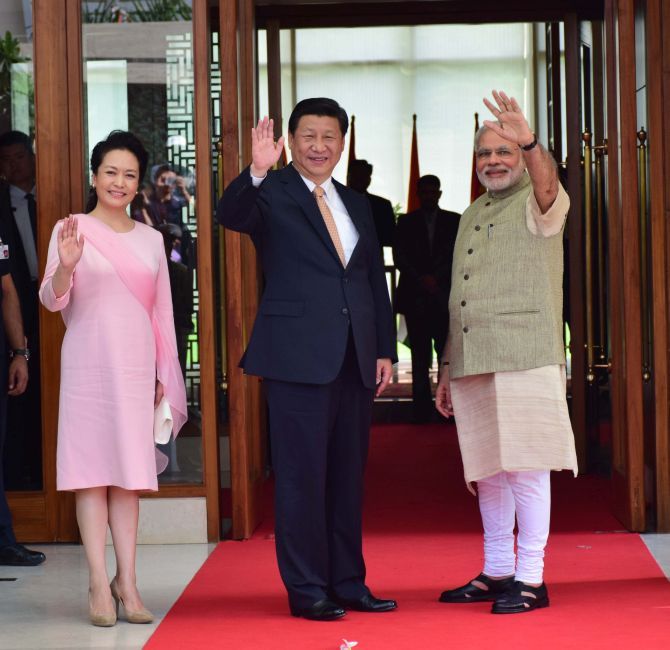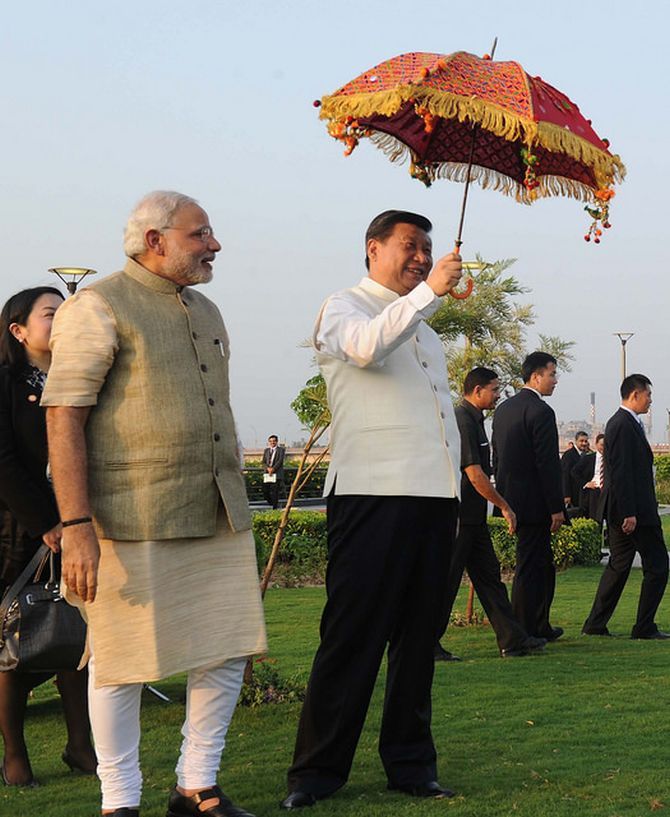 'A participant in many rounds of border talks with China once told me that China seemed not interested in resolving the border issue as it wanted to keep it as a ready excuse to intervene in the sub-continent,' says Colonel Anil A Athale (retd).
'A participant in many rounds of border talks with China once told me that China seemed not interested in resolving the border issue as it wanted to keep it as a ready excuse to intervene in the sub-continent,' says Colonel Anil A Athale (retd).
As the world balance of power, after a brief (200 years of European domination) hiatus, shifts to Asia, India-China relations have become critical input for world peace and prosperity.
After many years of being stuck in stagnation, India-China relations have seen forward movement under the new governments both in India and China.
More is to come as Indian Prime Minister Narendra Modi's key advisor National Security Adviser Ajit Doval has been recently appointed the point person for India-China border negotiations. India's economic relations with China are booming.
There is widespread expectation (in India at least) that if the border issue gets resolved then we can return to the days of 'Hindi Chini Bhai Bhai'.
How far are these expectations likely to be fulfilled?
Will Sino-Indian relations merely normalise or become something more?
Will it be a competitive or cooperative relationship?
Both India and China are ancient living civilisations/nations with a proud history. History continues to influence the present and it is therefore rewarding to have a brief look at it. It is true that prior to the 1962 clash between the two nations, military confrontation between the two nations was a rarity.
There were sporadic military expeditions by Mohammed bin Tughlaq in the 14th century and Zorawar Singh in the 19th century. Tibet itself remained a semi-independent buffer State. As and when central power weakened in China, Tibet became independent. It is also true that while China dominated Tibet militarily, it was Indian cultural and religious influence that prevailed there.
The Sino-Indian competition for influence saw full play in the South East Asian countries of Vietnam (Hindu Champa kingdom), Sri Vijaya's empire that stretched from Indonesia to modern day Malaysia, Cambodia and Thailand.
There is a qualitative difference between Indian and Chinese influence in South East Asia. While the Indian impact is primarily in the field of culture/religion/philosophy, the Chinese influence was cultural as well as military. As a residue of that history, while India is seen as benign, there is suspicion and fear of China.
Unfortunately for India, since the 16th century as a major part of India fought for survival against the invasions from the West, the contacts with South Eeast Asia withered away except for a brief flourish under the Vijaynagaram Empire.
In denial mode of its ancient culture, even after Independence in 1947, Indian contacts with South East Asia have not seen a revival. All that seemed to be changing now with the 'Look East' and 'Act East' mantra.
South East Asia will be the primary theatre of Sino-Indian competition.
The focus of improving Sino-Indian relations is on the border issue. The genesis of this dispute lies in 1954 when India accepted Chinese suzerainty over Tibet, but did not insist on clarifying the border and dismantled its own infrastructure in Tibet.
The issue came to head when in 1959 China occupied portions of Aksai Chin and built a highway linking the two restive provinces of Xinjiang and Tibet. It was a military necessity for China and of little strategic significance for India. The 1962 Sino-Indian border conflict was entirely focused on this area.
The fighting in the North-East Frontier Agency (now Arunachal Pradesh) was a sideshow and mainly a diversion. Right till 1990s Chinese territorial claims were confined to Aksai Chin. But in wake of the demise of the Soviet Union and Sino-American triumphalism, China began to refer to Arunachal as 'Southern Tibet' and increased the area of conflict with India.
At the same time, the growing Sino-Pakistan nexus brought about a change in Indian perception on Aksai Chin. This area now became of critical importance as a pressure point against the Sino-Pakistan joint threat. The Sino-American help to Pakistan in the nuclear field made the matters worse for India. It needs a reminder that President Bill Clinton's secretary of state Madeline Albright even attempted to 'outsource' the management of the Indian sub-continent to China in the mid 1990s.
The situation took another twist when in the 21st century, a new 'Cold War' started. Although it was a very mild war due to economic linkages between the US and China. Nevertheless, India again (after the end of the Sino-American alliance that lasted from the 1972 Shanghai declaration till the 1991 demise of the Soviet Union) became important to the US as counterweight to China as it was in the 1960s.
I was told in the US (in April 2000) that the US is determined to make India a superpower. This was openly articulated by then US secretary of state Condoleezza Rice in 2004. This change in US policy prompted China to be a little more adjusting on the border and also closer to Pakistan as an insurance against India.
A participant in many rounds of border talks with China once told me (in 1988) that China seemed not interested in resolving the border issue as it wanted to keep it as a ready excuse to intervene in the sub-continent.
 It seems that the shoe is on the other foot now! Chinese President Xi Jinping made a successful visit to India in September.
It seems that the shoe is on the other foot now! Chinese President Xi Jinping made a successful visit to India in September.
The minor border incident that occurred during his stay in India could well be an attempt by People's Liberation Army hardliners or an Indian attempt to highlight the issue, for surely the government does orchestrate the information on this to suit the national interest.
Faced with a far greater threat in the east from the Japan/US combine, China would be keen to shore up its western border. The Sino-Indian border row is an eminently solvable problem. India has reconciled to Aksai Chin being with China and despite its grandiose claims on Arunachal Pradesh, China is not in position to translate that claim into reality.
The 1962 debacle is not relevant as that kind of disaster would need a combination of political and military inaptitude. There is very little dispute on the border in the central sector as well.
India and China can easily demarcate the border in the east (Arunachal) and the centre and accept the status quo in the north (India lacks the power to alter it anyway). This suits China as it averts a two front threat. But does that suit India?
As a military historian I am appalled at the India naivete that let a golden opportunity pass in 1971, when Pakistan was on the ropes and we had an opportunity to make major gains in the Gilgit-Hunza areas that would have curtailed the Sino-Pakistan nexus.
The 'elephant in the room' being ignored is the Sino-Pakistan nexus. Till that does not transform to lower levels, should India settle the border with China? Another thorn is the presence of the Dalai Lama and Tibetan refugees in India.
I had argued with a Tibetan diplomat many years ago that the provisional Tibetan government in exile must display pragmatism and accept autonomy for outer Tibet.
This has been on the offer for a long time, but the hardliners amongst the Tibetans have insisted on this for inner Tibet as well. As the time passes and China grows stronger, even this may not be available to the Tibetans.
In reality the Sino-Indian border row resolution is hostage to the Sino-Pakistan nexus, the problem of Tibetan autonomy and global equations. While it is good for the Modi government to want to clean up our act vis a vis China, caution is warranted lest we repeat the Nehruvian blunder of 1954.
However, there are some practical steps that the two countries can easily take in mutual interest to build trust. Despite some major achievements in space exploration, neither India nor China is part of the International Space Station. It might as well be called the Western space station. This has been done since there are some obvious military implications.
India and China should go ahead and plan some joint space exploration projects. If despite the Cold War, the US and the USSR and now Russia can cooperate in space why not India and China?
The second area in which the two countries can collaborate is information technology. India and China combined are already the biggest users of information technology, mobile phones and the Internet. Yet the major operating systems are a monopoly of the US. Could not China and India come together to create a joint operating system and platform for universal use?
Being the world's No 2 and No 4 economies, it should be possible to bust the western monopoly. The numbers and economic clout is on the side of India and China and the world will be forced to switch to the newly created system.
Finally, there is much cultural similarity between India and China. All these years this aspect remained neglected as successive Indian governments, under the false notion of 'secularism,' refused to own its own heritage. It is time the two ancient civilisations re-create their civilisational bonds.
Action on these lines by India and China can make this century a truly an Asian one.
Images: Top: China's First Lady Peng Liyuan, Chinese President Xi Jinping and Prime Minister Narendra Modi in Ahmedabad, September 17, 2014. Photograph: MEA/Flickr. Bottom: Narendra Modi with Xi in Ahmedabad.
Colonel Anil A Athale (retd) is a military historian and coordinator of the Pune-based Indian Initiative for Peace, Arms-control & Disarmament.










